|
|
|
Sort Order |
|
|
|
Items / Page
|
|
|
|
|
|
|
| Srl | Item |
| 1 |
ID:
119861
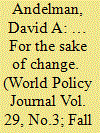

|
|
|
|
|
| Publication |
2012.
|
| Summary/Abstract |
In April, at an international conference in Palm Beach, I struck up a conversation with a senior adviser to ousted Italian Prime Minister Silvio Berlusconi. It was barely six months after he was forced to resign in November 2011. "So what's he doing now?" I asked politely. "Oh, he's planning for his comeback," the gentleman shot back with a broad grin. "And there's no doubt he'll be back."
|
|
|
|
|
|
|
|
|
|
|
|
|
|
|
|
| 2 |
ID:
131654
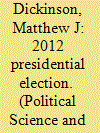

|
|
|
| 3 |
ID:
102535
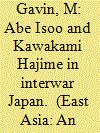

|
|
|
|
|
| Publication |
2011.
|
| Summary/Abstract |
This article explores the views of two eminent professors of economics, Abe Isoo (1865-1949) and Kawakami Hajime (1879-1946), regarding their socialist economic theories for easing poverty in Japan during the interwar years (1918-1939). Prior to this period, Abe believed the cure to capitalism's ills lay in a combination of socialist economic reforms (sangyô demokurashii) and individual spiritual refinement. Kawakami, at that time a bourgeois economist, prioritised the spiritual revolution of the rich over any socialist-type economic reform. Thus, although convinced of the need for a different approach to eradicating poverty, they nevertheless agreed in the need for gradual change rather than radical reform (Gavin East Asia An International Quarterly 24:1, 30). The year 1928 marked a significant turning point both for Japanese social movements and in the lives of Abe and Kawakami. That year heralded Japan's first national election under the new Universal Male Suffrage Law, and saw the police exercise their extended authority as they undertook a nationwide round-up of students and intellectuals suspected of left-wing tendencies (the March 15 Incident). Also in that year, Abe and Kawakami resigned from academic posts to dedicate themselves to alleviating the privations of the working class. Abe, by then well known as the father of Japanese socialism and as a Christian pacifist, became a symbolic figure for Japan's working class parties, although he later came to support the government during WWII. Kawakami, who was forced to resign from his post during the round-up, "washed his hands of bourgeois economics", became a prominent spokesman for Marxism in Japan ([28], xi, pp. 76, 169). This article will reveal that both Abe and Kawakami's social and economic theories changed during the interwar period, so that Abe came to see imperial sovereignty as crucial to socialist economic reform, while Kawakami came to see it as a minion of the capitalists and advocated institutional and political revolution.
|
|
|
|
|
|
|
|
|
|
|
|
|
|
|
|
| 4 |
ID:
109542
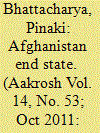

|
|
|
| 5 |
ID:
113283


|
|
|
|
|
| Publication |
2012.
|
| Summary/Abstract |
The African National Congress (ANC) in South Africa was formed under difficult conditions, facing a Union government bent on extending racist laws and an unsympathetic British government to whom repeated petitions were addressed without success. By the 1930s petitioning had run its course and the organization collapsed. In the 1940s, however, structures were established which laid the basis for mass activities in the following decade. In the 1950s a range of campaigns of resistance gave rise to a large ANC constituency. It also elaborated an alternative democratic vision through adoption of the Freedom Charter in 1955, after a process of lengthy consultation. The document became a rallying point for a range of democratic organizations. After the Sharpeville massacre in 1960 the ANC was banned, but continued to operate illegally. It embarked on short-lived armed activities, leading to the arrest and exile of its leading figures. The years that followed saw further setbacks as the organization sought to establish itself outside, and in small underground units inside, the country. After the Soweto uprising of 1976, many young people joined the ANC's armed wing and carried out attacks on apartheid installations. Significantly, this period also saw the revival of mass public political activities on an unprecedented scale. A combination of internal and external pressures against apartheid paved the way for negotiations, resulting in democratic elections in 1994. The ANC now governs, having fundamentally, albeit unevenly, transformed the lives of many-but continued poverty, unemployment, extensive corruption and criminality risk leading to a deep systemic crisis affecting governance as a whole.
|
|
|
|
|
|
|
|
|
|
|
|
|
|
|
|
| 6 |
ID:
111716
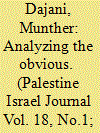

|
|
|
| 7 |
ID:
131235
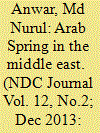

|
|
|
| 8 |
ID:
128548
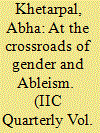

|
|
|
| 9 |
ID:
121136
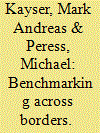

|
|
|
|
|
| Publication |
2012.
|
| Summary/Abstract |
When the economy in a single country contracts, voters often punish the government. When many economies contract, voters turn against their governments much less frequently. This suggests that the international context matters for the domestic vote, yet most research on electoral accountability assumes that voters treat their national economies as autarkic. We decompose two key economic aggregates-growth in real gross domestic product and unemployment-into their international and domestic components and demonstrate that voters hold incumbents more electorally accountable for the domestic than for the international component of growth. Voters in a wide variety of democracies benchmark national economic growth against that abroad, punishing (rewarding) incumbents for national outcomes that underperform (outperform) an international comparison. Tests suggest that this effect arises not from highly informed voters making direct comparisons but from "pre-benchmarking" by the media when reporting on the economy. The effect of benchmarked growth exceeds that of aggregate national growth by up to a factor of two and outstrips the international component of growth by an even larger margin, implying that previous research may have underestimated the strength of the economy on the vote.
|
|
|
|
|
|
|
|
|
|
|
|
|
|
|
|
| 10 |
ID:
172479
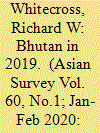

|
|
|
|
|
| Summary/Abstract |
Bhutan in 2019 was dominated by the change of government in late 2018, better diplomatic relations with India, and cultivation of relations with China. The economy was strong, with the country due to graduate from least developed country status in 2023, though unemployment is a concern.
|
|
|
|
|
|
|
|
|
|
|
|
|
|
|
|
| 11 |
ID:
179262
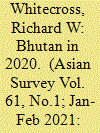

|
|
|
|
|
| Summary/Abstract |
The year 2020 in Bhutan was dominated by the coronavirus pandemic, a decline in state revenues, and territorial claims by China. In 2019, Bhutan’s strong economy suggested that the country would graduate from the least developed country category in 2023. The economic impact of the coronavirus pandemic on the economy makes this less certain.
|
|
|
|
|
|
|
|
|
|
|
|
|
|
|
|
| 12 |
ID:
024568


|
|
|
|
|
| Publication |
London, WeidenFeld and Nicolson, 1971.
|
| Description |
x, 358p.Hbk
|
| Standard Number |
297002775
|
|
|
|
|
|
|
|
|
|
|
|
Copies: C:1/I:0,R:0,Q:0
Circulation
| Accession# | Call# | Current Location | Status | Policy | Location |
| 007091 | 941.082/BRA 007091 | Main | On Shelf | General | |
|
|
|
|
| 13 |
ID:
140831
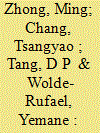

|
|
|
|
|
| Summary/Abstract |
We revisit the causal relationship between military spending and unemployment in the G7 countries applying a bootstrap panel causality analysis that accounts for both cross-sectional dependence and for heterogeneity across countries. Using per capita real GDP as a controlled variable, we found a unidirectional causality running from military spending to unemployment for Canada, Japan, and the US, one-way causality running from unemployment to military spending for France and Germany, and bidirectional causality for Italy and the UK. The empirical evidence does not seem to provide consistent results regarding the causal relationship between military spending and unemployment in G7 countries.
|
|
|
|
|
|
|
|
|
|
|
|
|
|
|
|
| 14 |
ID:
122490
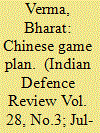

|
|
|
|
|
| Publication |
2013.
|
| Summary/Abstract |
With the opening of two fronts against New Delhi, Beijing will, in collusion with Islamabad, repeat '1962' in the near future on an enlarged scale.
As a tactical ploy for the past several years, Beijing and Islamabad have been dishing out sermons on friendship. China has used its lobby successfully in India to promote the concept that the two nations, instead of being at loggerheads with each other, should join hands to make the twenty-first century theirs.
|
|
|
|
|
|
|
|
|
|
|
|
|
|
|
|
| 15 |
ID:
146715


|
|
|
|
|
| Contents |
This paper dissects the current global economic crisis and its causes and consequences in the Americas and Europe. It notes that from the beginning of the present century onwards, the left wing governments that were elected in much of South America improved the lot of the poorest sections of society but did not curb the power of the entrenched business elites and landowning oligarchies in a context of economic decline and malaise. The dysfunctional democratic system of Brazil and the influence of the reactionary upper classes served by the media and supported by neoconservative Pentecostal evangelist churches, led to the overthrow of President Dilma Rousseff in a soft coup aiming to restore fiscal austerity and liberal economic policies.
|
|
|
|
|
|
|
|
|
|
|
|
|
|
|
|
| 16 |
ID:
119698
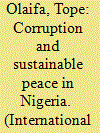

|
|
|
| 17 |
ID:
046339
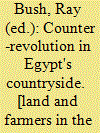

|
|
|
|
|
| Publication |
London, Zed Books, 2002.
|
| Description |
xv, 239p.
|
| Standard Number |
084277056X
|
|
|
|
|
|
|
|
|
|
|
|
Copies: C:1/I:0,R:0,Q:0
Circulation
| Accession# | Call# | Current Location | Status | Policy | Location |
| 046323 | 333.3162/BUS 046323 | Main | On Shelf | General | |
|
|
|
|
| 18 |
ID:
120733
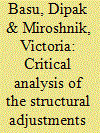

|
|
|
|
|
| Publication |
2013.
|
| Summary/Abstract |
The analysis of the Indian economy, since the structural reform to dismantle the mixed economic planning and to establish market economy, is presented here with clear analysis regarding growth of the macro economy, the real economy and the social impacts in terms of employment. The picture was quite dismal until the short-term portfolio investments from abroad were introduced a few years ago. The recent upsurge of growth is thus the result of these short-term foreign investments.
|
|
|
|
|
|
|
|
|
|
|
|
|
|
|
|
| 19 |
ID:
087864
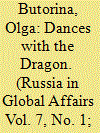

|
|
|
|
|
| Publication |
2009.
|
| Summary/Abstract |
The current crisis is often seen as a match to the Great Depression of the 1930s. Yet there is a hope that it would not evolve into a humanitarian disaster. The standard of living in the crisis-hit countries is much higher now than 80 years ago, and they are not facing the threat of all-out unemployment or poverty. The world's GDP is not going to fall by one quarter within the next few years, and hungry people will not be marching to Washington or other capitals, while inhuman dance marathons, such as the one in Sydney Pollack's movie is likely to forever remain a screenplay.
The two crises are similar in that they both began in the United States, with financial upheavals quickly engulfing the manufacturing sector and a majority of regions of the world. The key common characteristic is the breakdown of market mechanisms. In the 1930s, it was caused by the first wave of globalization. Production technologies changed dramatically at the turn of the 20th century: there was a breakthrough in the development of transport and communications, and transnational oil companies were established and gained a firm footing. As a result, certain national and colonial economies were drawn into the world economic system. The collapse of the New York Stock Exchange on October 24, 1929 put an end to an erratic market. It turned out that market forces could not run the world economy without an active participation by the state.
|
|
|
|
|
|
|
|
|
|
|
|
|
|
|
|
| 20 |
ID:
134029
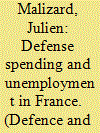

|
|
|
|
|
| Publication |
2014.
|
| Summary/Abstract |
France has received little attention in the literature of defense economics, despite some outstanding features of the country's situation. This study attempts to partially fill this gap with new empirical evidence which evaluates the influence of military expenditure on the unemployment rate between 1975 and 2008. Our estimation is based on the ARDL approach to cointegration. The results reveal that both defense and non-defense spending exert a negative influence on unemployment but that defense spending has a higher negative impact.
|
|
|
|
|
|
|
|
|
|
|
|
|
|
|
|
|
|
|
|
|